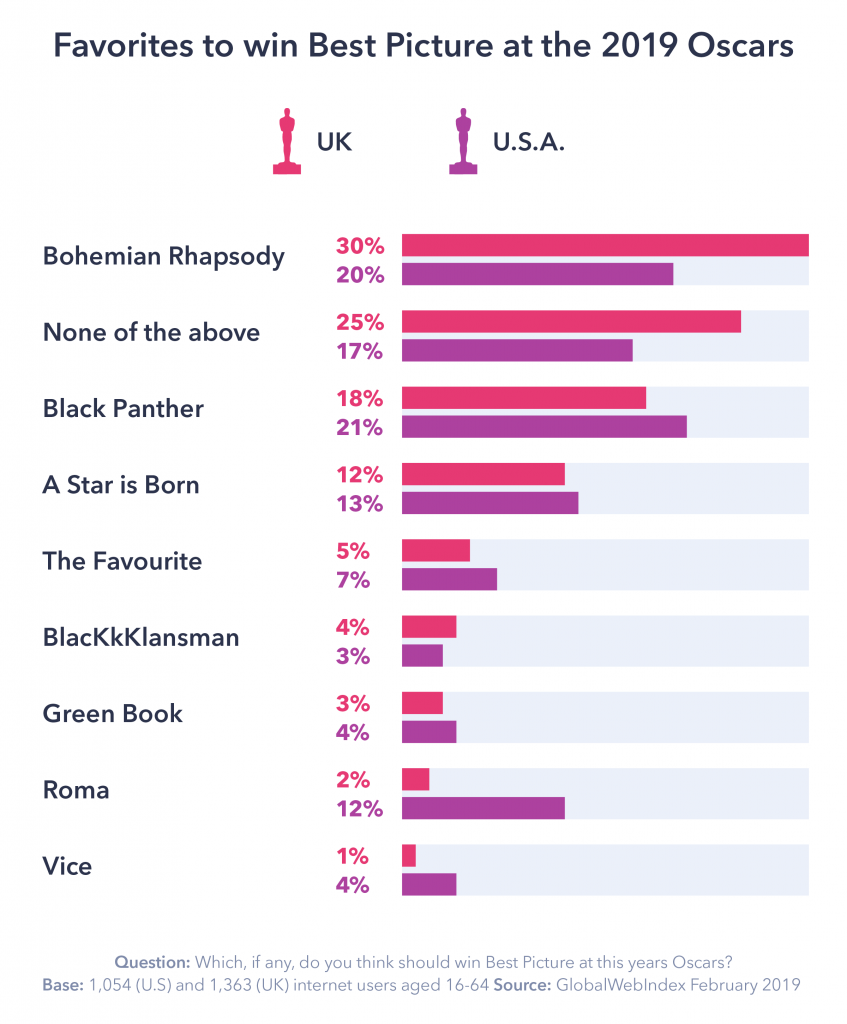The way we watch films has changed dramatically since the advent of streaming providers such as Netflix and Amazon Prime.
This has initiated a shift in attitudes towards the movie industry as a whole, with the added disruption of streaming services now producing their own features.
The 2019 Oscars are fast approaching and, despite the controversy surrounding it in recent years, many are looking forward to tuning in on 24th February.
But how will the changing face of film affect this prestigious ceremony?
In a recent survey of 2,417 U.S. and UK internet users, we explored their attitudes towards the Oscars 2019 and their movie-watching behaviors.
Oscars 2019 Impact in the U.S. Vs UK
Despite the Oscars’ public struggles, around 52% of internet users in the U.S. and 36% in the UK say they look forward to watching.
Internet users in the U.S. are also more influenced by movies that have won awards like an Oscar or a Golden Globe compared to their UK counterparts (55% vs. 39%).
And around 1 in 4 internet users in the U.S. and UK said they have not seen any of the oscar-nominated films from last year.
This lack of interest in the Oscars might partly be because the awards are often perceived as overly tedious and out-of-date with consumers’ interests and cultural conversations.
So what do audiences value? What features do they expect to see in an Oscar-winning film?
Putting Diversity First
Films that celebrate diversity, and do so in a visually stunning and compelling way, are stealing the hearts and minds of audiences. Coco, winner of best animated film at the Oscars 2018, is one example.
Set in rural Mexico and rooted in Mexican popular culture, Coco captured the most viewership of last year’s Oscar nominated movies in the U.S (41%) – beating last year’s best picture winner, The Shape of Water.
The film is immensely popular, particularly in China, where it’s the highest grossing Pixar movie of all time.
This year, the most watched film is Black Panther in both the U.S. and UK (44%). Black Panther is the first blockbuster superhero movie with a predominantly black cast. The film also became the third film ever to break $700 million at the North American box office.
Breaking down clichés and stereotypes, Black Panther epitomizes both artistic and political achievement.
In the U.S. and UK, Black Panther and Bohemian Rhapsody are the top two favorite movies to win Best Picture at the upcoming Oscars.
Around 1 in 4 internet users in the UK don’t think any of the nominated movies should win Best Picture.
Black Panther and Bohemian Rhapsody are favored more than niche movies like Netflix’s Roma and The Favourite, showing that blockbuster-style movies tend to attract more audiences and achieve greater scale.

The Oscars are making progress with inclusion. In 2015, the lead and supporting actor categories were dominated by white people, and so the #OscarsSoWhite was born.
The fact that Black Panther made it into this year’s Best Picture category shows how far the Oscars have come in terms of racial and gender representation.
We’re also seeing greater diversity in the directing categories too. So hopefully the hashtag will take a much needed vacation this year.
Around 60% of internet users believe the Oscars 2019 reflects greater diversity in films compared to previous years.
Among those who agree that diversity has improved, around 2 in 5 feel racial representation has improved the most.
Racial improvement is more prominent in the UK (54%), whereas the U.S. is more evenly split between racial (39%) and gender improvement (35%). But, for many respondents, diversity in the Oscars is far from perfect.
It’s essential for the Oscars’ industry chiefs to ensure inclusion and diversity are top priorities moving forward. That’s the main way the Oscars 2019 will engage viewers and remain relevant.
The Netflix Effect
We’re also seeing a radical shift in audience’s movie watching behaviors.
Over 50% of internet users in the U.S. say they turn to Netflix to watch movies for the first time, beating cinema, DVD and Amazon Prime Video to the post.
For respondents who aren’t fans of the Oscars, they’re almost twice as likely to watch a movie on Netflix than go to the cinema.
It’s also a similar case in the UK with cinema (48%) only marginally ahead of Netflix (46%).
Not only is Netflix disrupting the TV industry, it’s also making waves in the movie business too. The streaming powerhouse scored its first ever Best Picture nomination for Roma.
The movie received 10 Academy Award nominations, tying with The Favourite for the most Oscar nods this year.
It remains to be seen whether one of Hollywood’s top movie establishments will be ready to hand over the most prestigious award of the night to a streaming provider. But either way, Netflix isn’t going anywhere.
We can expect to see a further avalanche of original, critically acclaimed content streamed into the household’s of millions worldwide.
The traditional movie industry will continue to face an uphill battle to compete with streaming services and will need to work harder to give audience’s a compelling reason to make a trip to the cinema.



